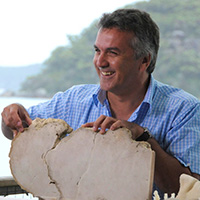Fast Facts
Location
Commencing
- Townsville: January, September
Fees
$8,320.00+
+estimated annual Commonwealth Supported Fee for a full-time study load. Please note this estimate is variable and subject to fluctuation depending on choice of elective subjects.
Plus Student Services and Amenities fee
Fee deferral and scholarships available if eligible
Currently displaying fees for 2025, which are subject to change in following years.
Duration
3 years full-time
Entry Requirements
ATAR 75
Recommended Knowledge
English (Units 3/4,C), Chemistry (Units 3/4,C), and General Maths or Mathematical Methods (Units 3/4,C)
QTAC Codes
- 316251
Course detail
Undertake research at the JCU Orpheus Island Research Station, or on-site at various coral reef, island, seagrass and mangrove environments visited when completing this degree. Develop a deep understanding of marine systems while studying in JCU's advanced research aquariums and laboratories. Learn how to best manage human impacts and preserve dynamic marine and coastal environments.
Develop high-level skills in evolving technologies that are providing solutions to previously unsolvable problems. Build your capabilities in the use of seabed mapping and fish assessment sonar, oceanographic sensors, and a range of technologies used for gathering data above and below the waves.
Build networks with international students who study this degree, and with the concentration of marine scientists and managers located in north Queensland. Opportunities may also exist to undertake an exchange program with an international university.
About JCU's Bachelor of Marine Science
Pursue your passion for the ocean and marine science with a JCU Bachelor of Marine Science - a comprehensive science degree studying the elements of the ocean with a strong focus on first-hand experiences. Access diverse learning environments including Orpheus Island on the Great Barrier Reef.
A Marine Science School with World-Class Teaching and Learning
The challenges facing our oceans require bold minds and creative solutions. Marine science students are trained to work with developing technologies. JCU offers a world-class education in Marine Science. Explore oceanography like never before with our cutting-edge technology, including sensors and radar.
JCU’s marine science degree has a focus on the sustainability of the oceans and coasts and is ideal for students interested in developing solid foundations in the biological, physical and chemical sciences relevant to coastal and ocean systems. Specialist marine science degrees suit those interested in sustainably managing healthy marine ecosystems.
Study Marine Science in the Most Beautiful Locations on Earth
Take advantage of JCU’s real-world practical experience. Study your marine science bachelor degree on-site at coral reefs, islands, mangroves, and seagrass beds including the Great Barrier Reef National Park. Access JCU’s research vessels and the JCU Orpheus Island Research Station and Aquarium Complex.
Learn from academics who are experts in their field and are passionate about addressing the challenges of our seas. Together with industry professionals, you will research solutions for the future and be part of a team solving problems that challenge scientists and managers today.
Understand how to collect data, map the seabeds, assess the health of marine life populations, look for underwater deposits, and monitor and track everything under the waves. Your research will take you to coral reefs, research ships and seagrass beds.
A Marine Science University with Great Learning Resources
Master the fundamentals, such as understanding biological processes, the chemistry of the ocean, coastal and marine geomorphology and fisheries science. Then, start planning field investigations and learn how to collect and analyse the data you find. Access the newest technologies and the most cutting-edge techniques to collate the data you need.
Learn how to draw logical conclusions from what you know and devise workable solutions to problems. Gain the skills to understand how the intricate ocean systems work together so you can manage them effectively. You will also master practical skills in working safely in diverse marine environments.
Marine Science at JCU - The Way to a Healthier Future for Our Oceans
JCU’s bachelor program in marine science offers students hands-on opportunities and invaluable experience that will help them succeed in the workforce.
View the handbook for a detailed overview of core subjects and available options.
Inherent requirements
Inherent requirements are the identified abilities, attributes, skills, and behaviours that must be demonstrated, during the learning experience, to successfully complete a course. These abilities, attributes, skills, and behaviours preserve the academic integrity of the University’s learning, assessment,and accreditation processes, and where applicable, meet the standards of a profession. For more information please review the inherent requirements for the Bachelor of Marine Science.
Honours
The Bachelor of Science (Honours) degree is available for high-achieving students. It consists of extra study and the development of a personal research project and thesis. An Honours degree is usually essential for entry to research higher degrees. Please refer to the Bachelor of Science (Honours) Handbook for eligibility information.
JCU Marine Science lecturers are deeply respected in their field and have contributed to ground-breaking research.
Graduates can pursue a career in a diverse range of areas including fisheries science and management, marine resource management and conservation, as well as coastal and marine geoscience, oceanography, and marine technology.
JCU Marine Science graduates find employment with both government and private industry, including engineering companies, in Australia and overseas. You could work as a marine conservation officer, a marine planner, or as an oceanographer. Alternatively, you could find employment as an aquatic veterinarian, a fisheries manager, a marine educator, or a communications and environmental manager. Many students progress onto postgraduate study.
Entry score threshold
These are the lowest adjusted scores we made an offer to in Semester 1, 2024. Entry scores are based on the most recent Semester 1 intake and are updated in June each year. Meeting the threshold doesn't guarantee admission.
ATAR/Selection Rank: 75.00
Entry score range
This table shows the range of entry scores for recent secondary students offered a place in the Bachelor of Marine Science for Semester 1, 2024. The table includes offers deferred to Semester 1, 2024 which may have been assessed using the entry score threshold of an earlier year.
JCU Townsville
| Without adjustments | With adjustments* | |
|---|---|---|
Highest | 99.95 | 99.95 |
Median | 84.20 | 86.50 |
Lowest | 71.25 | 75.10 |
Notes:
<5 – indicates less than 5 OP/ATAR-based offers made.
* Refer to Adjustment Factors
Find out more about who you might study with by viewing this course’s student profile.
Adjustment factors
James Cook University applies bonus ranks under the Regional Preference Scheme and QTAC’s Educational Access Scheme (EAS). Learn more about JCU’s adjustment factors.
Estimated annual Commonwealth Supported fee: $AUD8,320.00
A variety of Scholarships are available to suit different student types.
JCU Prep provides a pathway into this course. Enrolling in this flexible program will enable you to meet entry requirements including subject pre-requisites and ATARs. Introductory academic subjects are also available to prepare you for tertiary study.
*Excludes entry into the Bachelor of Advanced Science, Bachelor of Dental Surgery, Bachelor of Laws, Bachelor of Marine Science, Bachelor of Medicine, Bachelor of Surgery, Bachelor of Nursing Science – Bachelor of Midwifery, Bachelor of Pharmacy (Honours), Bachelor of Physiotherapy, and Bachelor of Veterinary Science (Honours).
Note the course QTAC code for the location you've chosen. You'll need to enter it as part of your QTAC application.
Application dates vary between courses, whether they're delivered in semester, trimester or carousel study modes. View our Application due dates page for more information.
ATAR score is indicative only. Entry scores will be finalised in the major offer round.
Real stories
-

Student
Marissa Hutchings
Bachelor of Marine Science
There is no doubt that JCU is the world’s best place to study marine science. The array of classes is just phenomenal, the field work opportunities are endless and the enthusiasm of all the lecturers is truly inspiring. With so much research going on, there are lots of opportunities for volunteering and networking.
-

Alumni
Astrid Mackegård
Bachelor of Marine Science
The field trips to Orpheus Island are plenty and were big highlights of my degree. Not only the hands-on experience such as measuring coral microatolls, but also surveying reef flats and making strong connections with lecturers, tutors, and fellow students.
-

Lecturer
Associate Professor Scott Smithers
Bachelor of Marine Science
The reasons that brought me to JCU, and have kept me here, are the concentration of world-class expertise in a range of disciplines relevant to marine science, and it is these same attributes, and the global reputation that follows, that make JCU an excellent choice for students considering study in this field.
-

Employer
Dr. Lyndon Llewellyn
Australian Institute of Marine Science
JCU students are of a like mind to us. They want to make the world a better place and they bring that desire into their work with us. They are practical, passionate and willing to tackle challenging problems through science.